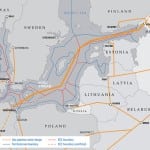The Uniper Global Commodities SE (Uniper) dispute highlights geopolitical and legal risks in volatile markets. Uniper, once Germany’s top Russian gas importer, was nationalized after it faced financial chaos when Russia cut supplies in 2022. Uniper then sought arbitration against Gazprom Export (Gazprom) to end its contract and claim damages. Despite winning, a Russian court shot back at Uniper with a $14 billion fine, raising doubts about enforcing arbitral awards against Russian state-owned entities, whether penalty judgments are enforceable outside of Russia, and highlighting the risk of potential asset seizures, especially for Uniper’s liquefied natural gas (LNG) vessels operating around the world.
Uncertain Enforcement of Arbitral Awards
The Uniper case shows how political tensions and sanctions can create unanticipated legal risks. Uniper ended its contracts with Gazprom after a Swedish arbitration tribunal awarded them €13 billion for undelivered gas. In return, a Russian court (the Arbitrazh Court of St. Petersburg and Leningrad Region) countered with a €14 billion penalty, claiming foreign restrictions prevented Gazprom from having access to justice, making the arbitration award unenforceable.
The decision was based on articles 248.1 and 248.2 of the Russian Arbitration Procedure Code, which allow Russian courts to claim exclusive jurisdiction over disputes involving Russian entities subject to foreign restrictive measures. While the providence of this part of the Russian Arbitration Code may be disputed, it is certainly conceivable that involving sanctioned entities in an arbitration can impose certain obstacles—for example, attorneys, arbitrators, or other counterparties may need to obtain a specific license, such as from an applicable government agency, before they may proceed with an arbitration involving a sanctioned entity.
In the Russian Arbitrazh Court, Gazprom argued that restrictive measures by foreign states rendered the arbitration agreement unenforceable, as it limited the company’s access to justice. The court agreed with Gazprom and held that the restrictive measures imposed by foreign states indeed create barriers to justice for Russian entities, which justify the Russian Arbitrazh Court assuming jurisdiction of the dispute in arbitration. The imposition of such a penalty by a court that Uniper did not agree to for resolving this dispute contradicts the express terms of the parties’ agreement. Uniper may also contest the Russian Arbitrazh Court’s subject matter jurisdiction over the dispute and its personal jurisdiction over Uniper, and the applicability of the Russian Arbitration Procedure Code to the dispute between Uniper and Gazprom, among other issues.
Nevertheless, even if Uniper successfully overcomes this ruling, enforcing awards against state-linked entities like Gazprom to collect its damages may be complex. In the meantime, Uniper is reportedly working, defensively, to protect its fleet of LNG tankers from seizure by nations friendly to Russia.
Yet, other companies have been successful in navigating the use of arbitral awards against state-linked entities, including Gazprom. As one example, in November 2024, Austrian energy company OMV Gas Marketing & Trading GmbH (OMV) secured an arbitral award of more than $230 million from the International Chamber of Commerce (ICC) due to irregular gas supplies from Gazprom to its German subsidiary. To enforce this award, OMV offset the amount against payments due under its Austrian gas supply contract with Gazprom. This self-enforcement method effectively allowed OMV to recover the awarded sum without initiating separate legal proceedings. Of course, questions remain as to whether Gazprom would challenge such action.
Protecting LNG and Energy Assets
With a shift to LNG and an uncertain world climate, companies must guard against adverse judgments and asset seizures in hostile areas. Strategies include structuring ownership in neutral zones, using strong contracts, and leveraging insurance. There are some challenges, however. Key among them are:
- Enforcement Uncertainty. Political tensions and sanctions complicate enforcing awards against state-linked entities like Gazprom.
- Asset Protection. Structuring ownership in neutral jurisdictions and using robust contracts may help to shield assets from geopolitical risks.
The strategic takeaways from this case include:
- Contract Clarity. Ensure clear dispute resolution terms and plan for contingencies such as political risk.
- Jurisdictional Advantage. Choose favorable legal climates.
- Due Diligence. Perform appropriate due diligence on counterparties and determine whether to proceed with the transaction, and if so, consider the best ways to address possible risks.
The Uniper case is a warning for companies operating in, or involved in, unstable regions. As energy disputes rise, proactive legal risk management and crisis management in the event of a dispute are crucial for survival. By adopting the strategies outlined above, companies can better navigate the complexities of international disputes and protect their assets in an increasingly volatile world.
—Aleksey Shtivelman is a partner in the Miami, Florida, office of Shutts & Bowen LLP, where he is a member of the International Litigation and Arbitration Practice Group. As a native Russian speaker and fluent in Spanish, Aleksey has successfully resolved high-stakes legal disputes for foreign and domestic clients doing business in many jurisdictions, including the U.S., Europe, Latin America, Africa, and Asia. Specific types of matters handled include breach of contract disputes involving power generation, energy, aviation and mining, sanctions and export controls compliance, real estate, and business investment disputes.









